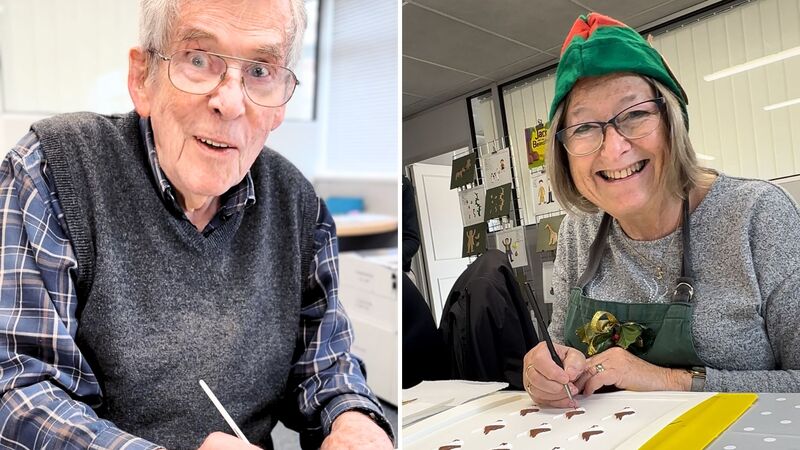You are viewing your 1 free article this month. Login to read more articles.
Gail Honeyman | 'I wanted it to be hopeful at the end'
The 30-something single woman who drinks a bit too much and has a crush on an unsuitable man is something of a trope in contemporary fiction. But the titular narrator of Eleanor Oliphant is Completely Fine (May, HarperCollins) is a truly original heroine. In the opening pages, Eleanor relates that she is 31 years old, works as a finance clerk in the back office of a graphic design company and lives alone in a flat in Glasgow—so far, so ordinary.
But it soon becomes clear that Eleanor is a bit of an oddball. She lives a tightly proscribed life, wearing the same clothes to work every day, eating the same meals and listening to “The Archers” every evening after work. She is bright and opinionated and can’t stand her irritating colleagues. But she also buys two bottles of vodka every Friday to drink over the weekend, spreading her consumption evenly over both days so she is neither drunk nor sober. She doesn’t see any friends and Monday, she observes, takes a long time to come around.
Eleanor Oliphant is Completely Fine addresses the pain of loneliness head-on, something that début author Gail Honeyman started thinking about when she read an article about a woman in her 30s who lived in a city and said that when she left work on a Friday night, she often didn’t speak to another human being until she went back on Monday morning. “It struck me as quite odd because it was very contrary to the media image of what it is to be 30 - life is all parties and so on,” says Honeyman, a softly-spoken Scot who has flown from her home in Glasgow to meet me in west London. “But it’s not a big stretch of the imagination to think how someone could find themselves in that situation through no particular fault of their own.”
Eleanor is lonely, partly because of her social awkwardness. She simply says exactly what she is thinking, with no filter and no regard for social niceties. This also makes her very, very funny. “It was fun to write someone who isn’t charming,” admits Honeyman. “She’s not a people-pleaser, she’s not someone who people naturally warm to. But that creates quite a lot of dramatic potential for everyday encounters.”
Much of the humour in the novel comes from Eleanor’s crush on a local rock star, Johnny, who she glimpses on a rare night out and decides to pursue. “I made myself laugh quite a lot because I would think about different situations and think, ‘What would Eleanor do?’” says Honeyman. “She would always do the strangest or the least predictable thing.”
A great reader of 19th-century fiction (which she studied as a postgraduate at Oxford), Honeyman says her central character was influenced by Charlotte BronteÃà’s most famous heroine. “I’ve read Jane Eyre quite a few times and I went back to read it again while I was writing this,” says Honeyman. “My sympathy was still very much with Jane but you can understand why [her aunt] Mrs Reed doesn’t like her very much. She is hard to like, she’s not charming, she’s very strange and she isn’t an endearing child. That in no way means Jane deserves to be treated badly, but there was a bit more nuance going back to it as an adult. I was influenced by that with Eleanor - she isn’t likeable but there are reasons for that. She’s had a horrendous start in life and that has clearly affected her ability to get on with other people.”
There is a mystery at the heart of the novel; why is Eleanor the way she is? The only connection she seems to have with her past is a weekly phone conversation with her snarling and vitriolic Mummy, and the occasional visit from a social worker. But this is chiefly a novel about the quiet joy of friendship, of connection. While Eleanor’s efforts to attract the attention of the rock star go nowhere, she is forced to contact the office IT support person when her computer crashes - the scruffy, unprepossessing Raymond. Although Eleanor tries to avoid him at first, events throw them together and slowly, despite her best efforts, a friendship develops.
It is this tentative friendship that gives the novel its heart and makes it so moving. It’s wonderful to read a novel in which a platonic friendship takes centre stage for its own sake and not necessarily as a precursor to a romantic relationship, although Honeyman says, “I wanted it to be hopeful at the end. She is not going to start a relationship but she’s in a place where she might be able to contemplate it and that’s about as far as she could have got in the course of the novel.”
I was hurtling towards 40 and I’d always wanted to write,. It does focus your mind, heading towards that big birthday. If there is anything you think you want to do, you think, ‘I probably should have a go now!’
Eleanor Oliphant... took Honeyman two years to write, during which time she was working full-time in administration at Glasgow University. It meant early starts, rising at 5.30 a.m. to write for a couple of hours before work, and spending lunch hours in a local café working on her novel. Although she enjoyed writing stories at school, it was a significant birthday that prompted her to start again. “I was hurtling towards 40 and I’d always wanted to write,” recalls Honeyman, so when she saw a Faber Academy writing course advertised in Glasgow - the only one the publisher has run in Scotland - she applied, writing her first fiction since she was a child. “It does focus your mind, heading towards that big birthday. If there is anything you think you want to do, you think, ‘I probably should have a go now!’”
Part way through the novel, she received a massive boost when she entered the opening chapters for the Lucy Cavendish Fiction Prize, and was shortlisted. Honeyman didn’t win the overall prize, but the agent Madeleine Milburn, who was a judge, offered to represent her. Once the novel was finished and ready to send out, Honeyman was primed by her agent to expect to hear back from publishers around two months later - but within a few weeks, Eleanor Oliphant is Completely Fine was at the centre of a fiercely fought eight-way auction on the eve of the 2015 Frankfurt Book Fair.
Metadata
ÔøºÔøºHoneyman’s characters are fully realised and entirely believable. Nobody does anything extraordinary for the sake of the plot. “I guess what you want is not to notice the plot creaking along,” she says, self-deprecatingly. “Hopefully, it’s funny in bits and sad in bits, but I think life is like that. Even with the most horrendous things that happen and the tremendous pain that people have to deal with, they still laugh because I think that’s what it means to be human. It’s never all one thing or the other if you are going to survive it.”
She then gets to the heart of Eleanor’s appeal and the reason, perhaps, that the novel has sold in 26 territories so far. “I thought it was important that Eleanor was never self-pitying, because I think as a reader that is when you lose sympathy for a character. Even if [a character] has been through horrendous experiences, if they are seen as self-pitying, it’s a very distancing thing. She’s broken but she’s not destroyed. She’s a survivor of it all.”









